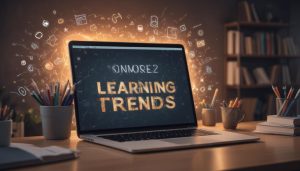Lifelong Learning Trends Reshaping Education for Everyone
Aiden Foster August 23, 2025
Lifelong learning is rapidly transforming how education and society interact, opening new doors at every stage of life. This article explores major trends, the benefits of continuous learning, the role of emerging technologies, and how to access flexible educational programs for skill growth.
Understanding the Lifelong Learning Movement
The concept of lifelong learning has evolved into a central pillar of modern education. No longer limited to childhood or young adulthood, education now encompasses an ongoing process stretching across every phase of life. Societies value learners who adapt, update skills, and remain curious throughout their journey. Access to education for all ages is strongly linked to economic prosperity and resilience. The drive for continual skill development has grown due to rapid technological shifts and an ever-changing job market. With knowledge advancing quickly, the notion that learning ends at graduation is fading. Instead, people are encouraged to embrace a mindset of constant discovery, welcoming new roles or transitioning between careers when needed. Whether aiming for professional advancement or personal growth, lifelong learning motivates innovation, civic engagement, and self-fulfillment.
Recent studies reveal that societies with established lifelong learning frameworks enjoy greater adaptability and economic stability. Governments, educational institutions, and employers collaborate to cultivate programs supporting upskilling and reskilling efforts. These joint initiatives pave the way for adults to access higher education, vocational training, or specialized short courses tailored to contemporary needs. Policies promoting inclusive access to learning foster equal opportunities for diverse communities. Social mobility and employability increase when education is seen as a lifelong commitment rather than a single milestone achieved in youth.
Lifelong learning also influences well-being and self-efficacy. People who continuously pursue knowledge report higher satisfaction and confidence, as learning fuels cognitive health and adaptability. Many nations now acknowledge adult learning as crucial for personal fulfillment and the creation of an engaged, informed citizenry. Whether through formal university courses, workplace training, or online learning platforms, opportunities have multiplied in response to global demand. The move toward accessible, lifelong education signals a shift in society’s understanding of growth and personal development.
Why Digital Skills Are at the Heart of Modern Learning
Digital skills are no longer optional—they are at the heart of lifelong learning and workforce readiness. The rise of artificial intelligence, cloud computing, and big data has driven demand for adaptable, tech-savvy individuals. Employers expect evolving digital literacy, whether in remote collaboration, coding, data analysis, or cybersecurity. Education systems around the world are integrating digital frameworks and programs to close the skills gap. For example, free online data analytics courses help learners transition smoothly into new fields. Lifelong learning gives everyone the chance to access adaptable, flexible, tech-powered curricula that match modern needs.
The global pandemic reinforced the necessity of digital skills as learning and work environments transitioned online. Platforms such as Coursera and FutureLearn now partner with universities and tech leaders to offer free or affordable upskilling courses, making high-demand knowledge accessible to more people. These courses are carefully structured, blending video lectures, hands-on assignments, real-world projects, and interactive assessments. Learners build proficiency at their own pace while receiving industry-recognized credentials upon completion. Digital literacy is a foundation for nearly every career; its inclusion in lifelong education is essential for staying competitive and versatile.
Understanding the importance of digital proficiency isn’t limited to technical careers alone. Teachers, healthcare professionals, small business owners, and artists all increasingly depend on digital literacy to operate effectively. Lifelong learning programs empower adults to develop technology skills regardless of age or background. This inclusivity ensures a robust, flexible workforce while reducing barriers for seniors or individuals re-entering the job market. Governments and NGOs work together to offer community workshops, online tutorials, and mentorship programs, aiming to bridge socioeconomic and generational divides.
Flexible Educational Models for Today’s Learner
Flexible learning models are a defining characteristic of contemporary lifelong education. Traditional, time-bound classrooms are giving way to blended, remote, and micro-learning experiences tailored to diverse lifestyles. Programs built around modular content, stackable certificates, and on-demand access empower learners to drive their own progress. Popular platforms such as edX, Alison, and MIT OpenCourseWare provide credentialed courses from leading institutions, enabling self-paced exploration. This flexibility is especially valuable for working adults, parents, or those living in remote regions.
Flexible learning supports personalized education journeys, allowing participants to choose subjects aligned with personal or professional goals. Micro-credentials and nano-degrees are becoming highly valued by employers, signifying targeted expertise in key areas. Adult learners leverage short-term, skills-focused programs to pivot into new industries without taking long, costly educational breaks. Many initiatives even provide career support services, peer discussion groups, and mentorship to maximize course impact. The ability to access quality resources anytime, from anywhere, democratizes learning and supports social equity.
This model doesn’t only benefit individuals. Businesses use flexible educational frameworks to upskill employee teams in real-time as market demands shift. Custom, business-centric courses foster agility and innovative practices. Flexible models also reduce dropout rates and improve engagement, as learners progress based on readiness rather than rigid schedules. The evolution toward anytime, anywhere education reflects the realities of adult life, supporting continuous improvement throughout personal and professional transformations.
The Expanding Landscape of Credentialing and Micro-Certifications
Credentialing and micro-certifications play an integral role in verifying and communicating acquired skills within lifelong learning ecosystems. Unlike traditional degrees, these bite-sized credentials can be earned quickly and stack to indicate proficiency in specific competencies. Digital badges offer visual, shareable recognition for skill milestones reached through accredited short courses or industry assessments. This dynamic system is fueling a new wave of workforce-ready professionals adept at adapting to change.
Industries increasingly recognize micro-certifications as legitimate evidence of expertise—particularly in fast-evolving sectors. Tech companies, for example, value up-to-date certifications in cloud computing or coding more than a decade-old diploma. Online platforms issue badges supported by blockchain technology to prevent fraud, ensuring impartial skill validation. These portable, modular credentials help job seekers stay visible to recruiters and simplify hiring for employers, facilitating faster transitions and matching talent with open roles.
The flexibility of micro-credentials complements lifelong learning by supporting just-in-time mastery of new subjects. Learners gain confidence pursuing short, manageable objectives even while balancing other responsibilities. Fractioned courses enable ongoing career progression and continual advancement, opening doors that might remain closed under a traditional credentials-only model. Governments and universities now partner with industry leaders to ensure these digital badges align with rapidly changing workforce needs, creating a responsive model that supports economic resiliency.
Social and Economic Benefits of Lifelong Learning
Lifelong learning’s impact extends far beyond personal growth—it plays a central role in the well-being and prosperity of entire societies. Increased participation in adult education is linked to lower unemployment rates, greater workforce productivity, and higher civic engagement. Programs offering upskilling pathways contribute to reduced inequality and greater inclusion across generations. When adults have access to continuous learning opportunities, gaps in digital skills and academic achievement can shrink.
Socioeconomic research demonstrates that people who remain engaged in learning live longer, healthier lives. Cognitive stimulation helps protect against age-related decline and enriches community life. Lifelong learning encourages social cohesion as people from different backgrounds collaborate and share ideas. Employers note reduced turnover and improved morale when staff pursue personal and professional goals through training and further education. This strengthens community bonds and drives innovation, with ripple effects impacting family members, neighborhoods, and local economies.
Lifelong learning also serves an essential function in preparing societies for uncertainties like automation and globalization. The ability to adapt is a defining feature of modern economies. Public policies supporting adult literacy, STEM re-skilling, and social mobility provide a foundation for resilience in uncertain times. As technologies evolve, so must educational strategies—lifelong learning ensures individuals are ready for whatever the future brings, ultimately elevating both personal and national prospects.
How to Access Lifelong Learning Opportunities
Accessing lifelong learning has never been easier thanks to a blend of brick-and-mortar centers and expansive digital platforms. Community learning centers, public libraries, university extension programs, and online resources all offer courses tailored to adult learners. For those unsure where to start, government agencies and non-profit organizations provide guidance and matching tools based on interests and experience. Many platforms, such as OpenLearn or Grow with Google, welcome all participants regardless of background or location.
With so many online options, it’s important for learners to verify course accreditation and relevance to their goals. Platforms listing structured, peer-reviewed content—like Coursera, edX, or FutureLearn—are ideal for recognized skill-building. Meanwhile, professional associations and labor unions often host industry-focused workshops for upskilling or credential renewal. Engaging with peer communities or mentors enhances the learning experience and can spark deeper connections within fields of interest.
Financial support and flexible scheduling further remove barriers to participation. Many scholarships, grants, or employer-sponsored tuition assistance programs help working adults continue their education. Learners are encouraged to explore public grant databases and inquire with professional organizations for up-to-date offerings. As societies continue to value and invest in education at every age, there’s no shortage of opportunities for individuals to embrace the lifelong learning mindset and benefit from the changing landscape.
References
1. UNESCO. (2023). Lifelong Learning. Retrieved from https://unesdoc.unesco.org/ark:/48223/pf0000371588
2. European Commission. (2024). Digital Education Action Plan. Retrieved from https://education.ec.europa.eu/education-levels/adult-learning
3. Coursera. (2024). The Future of Work and Skills. Retrieved from https://about.coursera.org/press/wp-content/uploads/2024/04/Coursera_Skills_2024.pdf
4. OECD. (2023). Skills Outlook 2023: Lifelong Learning for Opportunity and Growth. Retrieved from https://www.oecd.org/education/skills-outlook-2023/
5. MIT OpenCourseWare. (2024). The OCW Story. Retrieved from https://ocw.mit.edu/about/
6. U.S. Department of Education. (2023). Advancing Adult Education and Literacy. Retrieved from https://www2.ed.gov/about/offices/list/ovae/pi/AdultEd/index.html







